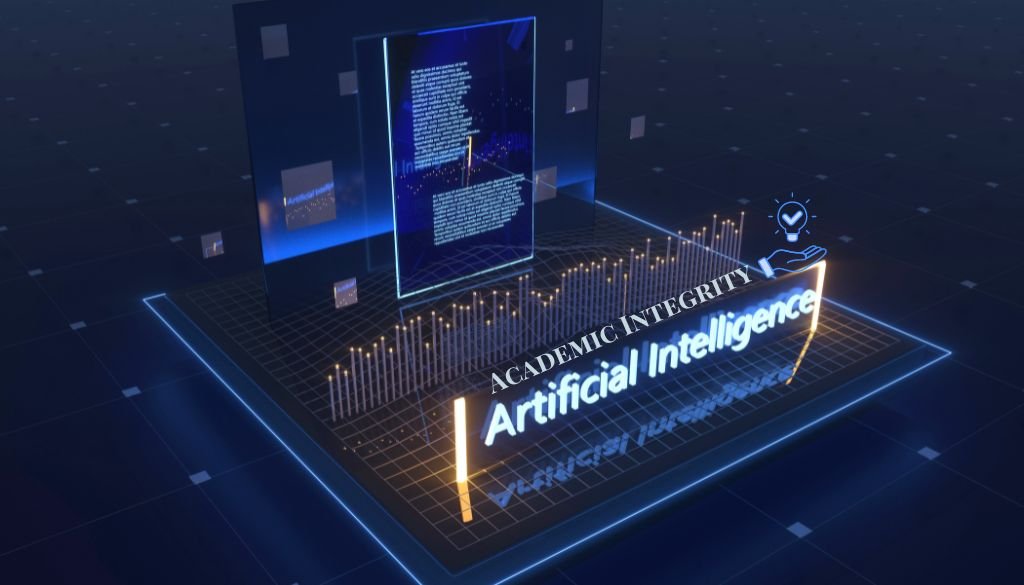Key Takeaways
- AI assists in enhancing academic integrity by detecting and preventing plagiarism.
- Technological advancements help educators and students maintain educational standards.
- AI tools offer valuable learning opportunities by providing feedback on writing quality.
Introduction to AI in Education
In recent years, the educational field has experienced a notable shift due to the incorporation of AI technologies. These advancements are not merely futuristic but actively reshaping how educators and students approach the learning process.
AI’s applications in education extend beyond plagiarism detection. These technologies offer various benefits, from personalized student learning experiences to automated administrative tasks, freeing educators to focus more on interactive teaching methods. Schools use AI to make operations more efficient, improve learning results, and equip students for a digital future.
The Role of AI in Detecting Plagiarism
One of the most impactful applications of AI in education is its ability to detect plagiarism. According to MarketWatch, AI technologies can rapidly analyze large volumes of text, comparing student submissions against academic databases and online sources. This capability ensures that educational institutions uphold integrity and fairness, allowing genuine student work to stand out. Tools like the AI checker from Turnitin are prime examples of AI’s role in maintaining academic integrity by detecting plagiarism efficiently.
Traditional plagiarism detection methods often involve manual checks, which are time-consuming and limited in scope. AI-enhanced platforms, however, can provide instant results, highlighting potential issues for further review by educators. This increased efficiency helps maintain high academic honesty across educational institutions. Additionally, AI tools can flag verbatim text matches and paraphrased content that could be considered academically dishonest, providing a comprehensive solution to maintain integrity.
Enhancing Teaching with AI Tools
AI tools have become indispensable assets for educators aiming to enhance their teaching methods. Innovations like automated grading systems relieve educators from repetitive tasks, enabling them to invest more time developing interactive lesson plans. Personalized feedback applications offer students constructive criticism specific to their needs, thus fostering a more engaging learning experience. Additionally, AI can facilitate the creation of dynamic and adaptive curricula that adjust in real-time based on student performance and engagement levels. This allows educators to modify their lesson plans on the fly, ensuring that content remains relevant and effective for all students.
Furthermore, AI can help identify patterns in student performance, allowing educators to adjust their teaching strategies accordingly. Teachers can offer targeted support by recognizing areas where students commonly struggle, ensuring no student is left behind. AI-powered analytics and dashboards enable educators to gain insights into class performance and attendance trends and even predict student success, making it easier to intervene when necessary. These tools can also provide educators with valuable information on the effectiveness of different teaching methods, enabling continuous improvement in instructional practices. By integrating AI into the classroom, educators can create a more responsive and personalized learning environment that adapts to the needs of each student.
AI’s Impact on Student Learning
The incorporation of AI in education offers students a truly personalized learning experience. AI-driven platforms can assess a student’s performance and adapt lessons to suit their unique strengths and areas of improvement. According to a Forbes report, AI can offer custom exercises and resources, enabling students to focus on honing specific skills. This tailored approach helps students progress at their own pace, reducing frustration and increasing motivation by providing challenges that match their skill level.
This personalized approach extends beyond academic subjects. AI can also aid in developing crucial skills such as critical thinking and problem-solving, providing a well-rounded educational experience that prepares students for future challenges. Using adaptive learning platforms, students receive immediate feedback and can focus on topics that need extra attention, improving their understanding and retention of information. Additionally, AI can support collaborative learning by facilitating group projects and peer-to-peer interactions, helping students build social and teamwork skills. The continuous assessment and real-time feedback AI provides ensure that students are always aware of their progress, enabling them to take an active role in their learning journey.
Ethical Considerations with AI
In education, it is crucial to acknowledge the ethical implications of utilizing AI despite its many benefits. Protecting data privacy is a significant issue, given that AI systems typically need extensive personal information to operate efficiently. Educational organizations need to enforce strong security measures to safeguard student data. Another crucial concern is the possibility of bias in artificial intelligence algorithms. If not adequately addressed, biased data inputs can lead to skewed results, harming the very students the technology aims to help. Ensuring transparency in AI processes and continuously monitoring for biases is crucial for maintaining fairness and equity in education. This involves regular audits of AI systems and datasets to identify and mitigate any sources of bias.
Additionally, the ethical use of AI should involve ongoing dialogue between educators, administrators, students, and technology providers to ensure that AI tools serve the best interests of all stakeholders. Establishing and following ethical guidelines and best practices is essential to ensure that AI implementations are both responsible and effective. Educational institutions can harness the potential of AI and mitigate its risks by promoting ethical awareness and accountability within their culture. It is also essential to educate students about the moral implications of AI, preparing them to navigate and contribute to a future where AI plays a significant role in society.
Future Trends in AI for Education
The future of AI in education looks promising, with numerous exciting trends on the horizon. Advanced AI tutoring systems are being developed to provide even more tailored educational experiences. These systems will use sophisticated algorithms to understand students’ learning styles and adapt lessons dynamically.
Furthermore, the integration of virtual reality (VR) with AI holds the potential to create immersive learning environments, making education more engaging and effective. Advanced analytics will continue to play a significant role in identifying learning patterns, enabling educators to refine their teaching strategies continually. Keeping up with these trends will be essential for educators and institutions aiming to stay at the forefront of educational innovation, ensuring that AI’s benefits are maximized for future generations of learners.
Moreover, as AI technology evolves, we’ll likely see even more innovative educational applications, such as AI-driven curriculum design, real-time language translation tools, and enhanced accessibility features for students with disabilities. By embracing these advancements, educators can offer more inclusive, effective, and engaging learning experiences that cater to their students’ diverse needs.
For more insightful articles, please visit globalexpressinfo.com






